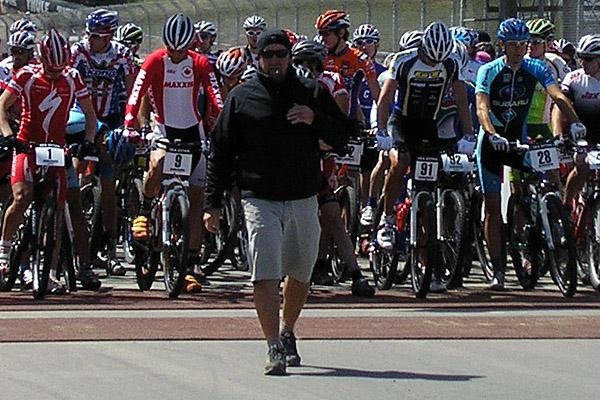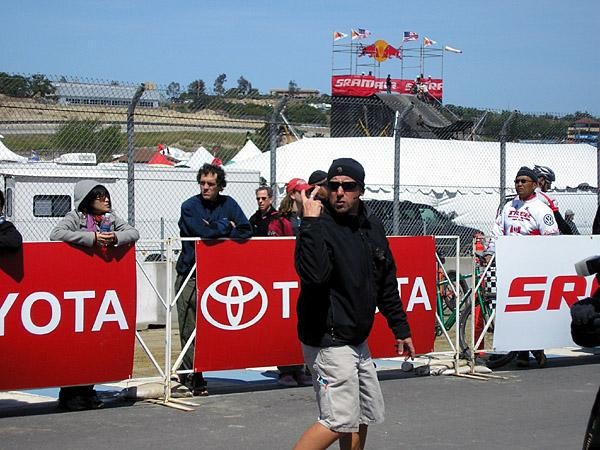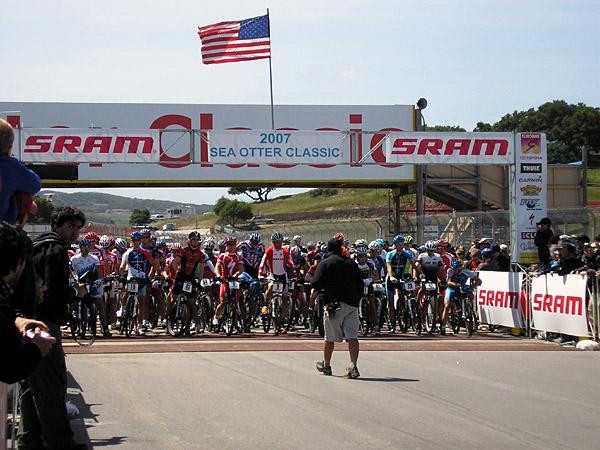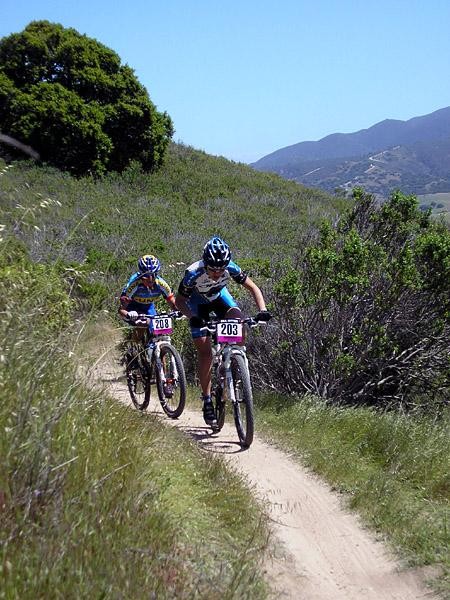Behind the NMBS scenes
There are so many acronyms in mountain biking that even the pro racers can't keep them all straight;...








An interview with Jeff Frost, August 11, 2007
Jeff Frost is the man behind the National Mountain Bike Series (NMBS) - the series targeted by top pro US and international mountain bikers racing in the US. Cyclingnews' Sue George talked with Frost to find out what it takes to make the series happen and how it got to be where it is today. The 2007 NMBS wraps up this weekend in Snowmass, Colorado.
There are so many acronyms in mountain biking that even the pro racers can't keep them all straight; however, "NMBS" is worth remembering since it represents the highest profile national series of off-road races and the majority of the UCI points-awarding mountain bike events in the US. The series' races comprise the meat of most major domestic teams' programs and are also part of the USA Cycling National Mountain Bike Calendar.
Jeff Frost is main man behind Blue Wolf Events, the company that now owns and runs the NMBS. He's based in Salt Lake City, Utah, but his first taste of the national series came back East.
Getting hooked by the series
Frost started his racing career in the Maine mountain bike series. "I started as a sport and then won and upgraded to expert," said Frost. "I raced expert for four to five years in New England."
"My first national series experience was in the expert race at Mount Snow. I just loved it: the music, sounds, competition, and the calibre of the competition. It was great to race the guys from all over the nation. It sold me on the value of the national series as a racer."
Get The Leadout Newsletter
The latest race content, interviews, features, reviews and expert buying guides, direct to your inbox!
"I was working in the ski business and riding in the summer. The ski business was figuring out how to keep people employed year-round. I ended up going into management with something I love. For me, it was mountain biking because I raced mountain bikes. The ski resorts embraced the sport, starting in 1989, at Sunday River Ski resort in Bethel, Maine. We began lift serviced mountain biking in the summer. I ran the New England Mountain Bike Series called Trail 66 for years."
"From my race experience, I learned what I liked about events and what I didn't. I started promoting very grass roots events and working my way up."
In a way, you could say Frost graduated to his current position as NMBS director. "I ran many world cups at Mount Snow. I started with the national series about eight years ago as a crew person - banners, signage, technical director stuff. I've grown with the series as it's grown to the point where I own the property."
When not running the NMBS, Frost spends time working for the Sea Otter Classic. "I've been director of athlete services. I run all the competitive events. It's one of my most satisfying experiences. That's my other hat that I wear."
"In this business, it's difficult to make a living off of one event. You try to put your skill set to use at a bunch of different events. I'm working with the Danskin women's triathlon series and am working to develop an event for the city of San Jose, California."
"I've had to learn the business side. It's been hard for me. I've had to learn that you don't always have the resources available to do all the things that the athletes want you to do."
For the love of it
Frost's racing career has subsided, but his love of the sport has stayed strong. "Although I don't race as much as I like too, I still ride often. It's a bad day if I don't ride, but it's not a bad day if I don't race.
"Racing at my age is harder," said the 46 year-old. "It's harder to go fast. I want to go as fast as I used to go, but I just don't.
Now he directs his energy toward race promotion. "The National series is my passion. I don't consider it a vocation. It's not work. It's always been part of my deal as long as I can remember," said Frost. "Every day in this business is not the same. It keeps it exciting."
Frost said the pinnacle of his professional success was serving as venue manager for the 2002 Olympic Games at Park City Mountain Resort. His focus was on snowboarding, but he said, "I've moved out of that now. It's a young man's sport. I'm too old. They new generation has different perspective."
The history of NMBS
The NMBS series was once owned by USA Cycling and referred to as the NORBA National Series. Hang out on the race scene and you'll still hear a lot of old school racers using the "NORBA" lingo.
"The origins are in debate, depends on whom you talk to. Most people agree the series in its current structure started at Mount Snow in 1987 or 1988," said Frost.
"It was basically the boys at the west hill shop in Putney, VT, who started it. Brian Stickel is the Yoda of mountain bike racing. He's been out of this a bit, but he's the guy who started the structure-going to different venues doing national calibre racing for elite and grassroots racers."
The Putney men worked for NORBA, then separate from USA Cycling until the buyout. "From 1990 until 2002, USA Cycling owned and controlled the series. They would hire different people to manage the series for them. It was important for them to maintain control and for their membership, which was at a pinnacle."
"In 1998-99, the decline started. It hit rock bottom in 2002, when Outdoor Life Network (OLN) pulled out as series sponsor, and we lost many of our key partners. In 2002, we had a huge exodus of sponsorship dollars."
Team Big Bear's Tom Spiegel and Frost used to be partners. The two took over the series when Gale Force stepped out five years ago, in 2002. Frost took over solo in 2006. Big Bear still provides timing services.
Frost's company signed a license agreement to take over the national series brand. "USA Cycling decided they are no longer in the event management business. They think the series is a dinosaur. They are taking a new approach: the National Mountain Bike Calendar (NMBC). For them it's an easy transfer because their focus has shifted."
"We've been rebuilding the series. Back in the early 1990s, there were 2,800 to 3,000 athletes. Now there are 1,200 to 1,500, with about 2,000 starts, which still put the races among the largest mountain bike events in the country. However, compared to old days, the series is half its size."
Trying to keep everyone happy
The NMBS brings together, athletes from different disciplines, fans, media, sponsors, and venue owners. Everyone comes to it with their own expectations.
"It's always trying to balance the ideal versus the real. Athletes are often idealistic. Sponsors are the same way. Sponsors would love to have banners hanging from trees and inflatables everywhere. It's just not always possible."
"The series' evolution has been to continue to provide high quality race venues for both sets of athletes [cross country and gravity]--sometimes those aren't the same."
"It is always about finding balance over course of series of venues. A good cross-country venue is not always a good downhill venue and a good downhill venue is not always a good cross country race venue. It's good to find, over the course of series, a bunch of venues that produce best all-around rider so it's not the best climber or the best descender who wins."
The NMBS strives to cater to amateur and pro racers. "We try for both. We believe in associating ourselves with the state series. So in North Carolina, we associated with Cane Creek series. We did the same with California and Texas. It helps us attract local and regional racers."
Frost has noticed some shifting demographics. "Mountain biking is a hard sport, but that's what makes it rewarding. However, we're getting older. We've seen our 30+ age group grow, but the 19-29 age group is shrinking. Yet, the under 18 group is growing. One of our number one goals is to understand how to make mountain biking relate-able to the public."
"Our goal is to figure out how to make the guy who rides a bike or is interested in riding come out to watch others. We do this with clinics on site, like with Alison Dunlap's free clinics for women. We make expo/team areas open - like with NASCAR. We try to create a story behind individual riders and figure out how people in the area of the race can relate to them."
Frost has an idea of how to make racing more attractive to new participants. "I think the whole beginner, sport, and expert thing is difficult to understand. There is some movement within USA Cycling to go to age-graded racing. It would be easier to understand. I think it would create an easier entree to the sport. There would still be the elite level of course." He pointed to triathlons and running as other grassroots sports operating successfully under this model.
Picking venues
According to Frost, venue selection is a function of the continued philosophy of hosting all the disciplines at one location. "We do not believe in splitting up the disciplines. That's been a criticism of the NMBS lately."
One reason for this approach is that it makes hosting a venue economically feasible for the individual race promoters. "You can develop efficiencies when you have that many riders. There is the balance between the business and the competition sides."
Experience plays a role. "We look at venues that first and foremost have some sort of mountain bike race history. Like if they-the promoters or the venue-have done mountain bike races in the past. We rarely go to a venue that's never had a mountain bike race before because the challenge to create the infrastructure to host a race is unbelievable."
Frost said he was talking to potential hosts for 2008 early in 2007. He mentioned conversations with promoters in Georgia, Idaho, and Missouri.
The process for hosting an NMBS event is fairly straightforward. "A promoter contacts us. We know the bigger events out there." Then a site visit follows, during which Frost walks the course and figures out locations for expos, tech zones, and lodging.
Venues are generally limited to ski resorts because Frost asks questions like, "Is there a quad or high-speed detachable lift? Do they have the staff in summer to support the race, especially medical/first aid? Do they have ski patrol that can work in the summer?"
Occasional exceptions do occur. In Fontana, vans and trucks transported riders for the downhill. "We do same at Sea Otter, but it's cost prohibitive." As another exception, no downhill was held in Phoenix, a venue he hopes captures the momentum and excitement of the former Cactus Cup.
Frost looks at whether candidate hosts have potential sponsors and partners for summer events. "It's a business decision at end of the day." The hosts and Frost's company split the risk of hosting an event, but Frost said, "If it's at a ski resort, it's much easier. They look it at as revenue in the summer: heads in beds. If it's individual promoters, it's much tougher."
Running the numbers
Frost budgets a typical event from US$130,000 to $140,000. It includes prize money, medical expenses, electricity, staffing, and running the lifts. He said sponsorship is an important key to funding the budget. "The revenues without sponsorship aren't even close to that. Unless you look at it as marketing expense or they can leverage local businesses/support, it's hard to justify it.
To help fund the 2007 series, the NMBS created the Alliance program and partnered with six industry partners: Maxxis, Trek / VW, Gary Fisher Subaru, Bear Naked Cannondale, Kona, and Luna--one for each event. The partnerships also helped ensure the attendance of these major sponsors' teams, thus guaranteeing a deep field of pros.
Prize money minimums are dictated by the UCI, and because the NMBS offers UCI points, it must comply. 2007 prize money totalled US$60,000, a significant portion of the total US$200,000 offered by the NMBC, for just seven weekends of racing.
Frost submits races by mid-May of every year to the UCI in order to make its calendar. The process is called inscription. He considers it risky because typically sponsors won't come onboard until December. It costs US$3,500 for Frost to call any event a C1 event.
Such categorization doesn't directly benefit amateur races, who make up a majority of the field, so many major American races choose to forego the certification. Frost believes UCI affiliation is important. "It's our responsibility as national series to inscript with UCI. I can't call myself as national series and not offer UCI points. If we're going to be the biggest and the best, we have to play by those rules that dictate that, which are those of UCI."